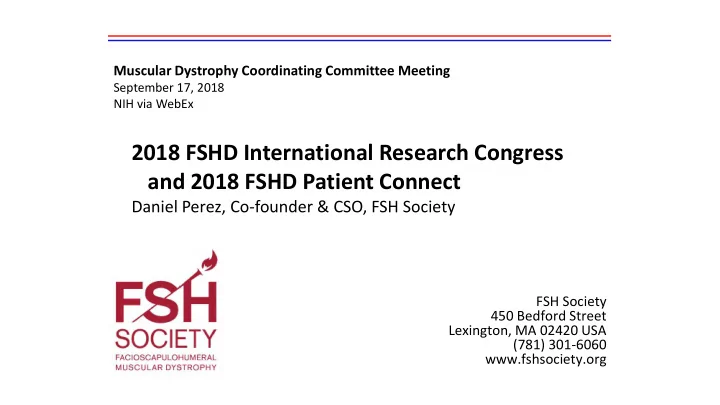

Muscular Dystrophy Coordinating Committee Meeting September 17, 2018 NIH via WebEx 2018 FSHD International Research Congress and 2018 FSHD Patient Connect Daniel Perez, Co-founder & CSO, FSH Society FSH Society 450 Bedford Street Lexington, MA 02420 USA (781) 301-6060 www.fshsociety.org
Day 2 [0.5 day] Day 1 [1.0 day] International “lab Review/Data dump meeting” Review of previous Discussion/Planning year’s priorities as stated Planning and problem by FSHD workshop solving session(s) 5 platform sessions (30+ Moderated discussion presentations) sessions with entire group focusing on data poster sessions (25+ presented at day 1. posters) Identify and troubleshoot bottlenecks; and, define Recap the research/clinical priorities for the next year 2018/2019 https://www.fshsociety.org/wp- content/uploads/2018/06/2018ResearchConferencePro gramFINAL.pdf
Last year’s FSHD research priorities are reviewed at the outset of the International Research Congress IRC Workshop. Additionally and subsequently, presenters are asked to indicate in talks/posters which priorities they have addressed
https://www.fshsociety.org/wp- content/uploads/2018/06/2018IRCAbstractBook.pdf
2018 FSHD International Research Congress and Research Planning 5 Platforms Genetics, epigenetics, and related syndromes and diseases, cancers, and BOSMA Arhinia) The role of DUX4 in development and disease Preclinical studies in FSHD, including cellular (myoblasts/ iPS) and animal models Clinical studies and clinical trial Industry aspects and therapy development (screens)
New and current FSHD research priorities were defined by the “core” global FSHD research community at the 2018 International Research Congress IRC Workshop June 8, 9 in Las Vegas, Nevada Drs. Nuckolls and Carifi sent to MDCC members via e-mail on https://www.fshsociety.org/wp- 9/11/2018 content/uploads/2018/08/2018-IRC-Priorities.pdf
2018 FSHD International Research Congress and Research Planning 4 Current/new priority areas for FSHD Therapeutics Pathophysiology Molecular Mechanisms Genetics and Epigenetics
2018 FSHD International Research Congress and Research Planning 1 Therapeutics Trial Tool Kit. Biological Biomarkers. Clinical Outcome Assessments. Alternative/complementary therapies.
2018 FSHD International Research Congress and Research Planning 2 Pathophysiology DUX4 With Regard to Fibrosis, Inflammatory Infiltrates and Fatty Infiltration. Temporal Analyses of Models. Novel Models for Other Aspects.
2018 FSHD International Research Congress and Research Planning 3 Molecular Mechanisms Mechanisms of DUX4 Pathology. DUX4 Functionality. DUX4 Native and Conserved Function.
2018 FSHD International Research Congress and Research Planning 4 Genetics and Epigenetics Harmonization of Genetic Testing. Disease Continuum and Genotype Classification. Understanding Drivers of Clinical Variability. Role and Effects of Modifiers.
2018 FSHD International Research Congress and Research Planning 3c Sample: Molecular Mechanisms DUX4 Native and Conserved Function. The natural distribution and regulation of DUX4 expression should be studied. DUX4 is expressed at cleavage stage embryos but little is known about the regulation of DUX4 during development and which tissues express DUX4, as well as its (lack of) toxicity in those tissues. The distribution of DUX4 in FSHD muscle is not known, nor how it correlates with clinical and pathological aspects of FSHD muscle, nor at the preclinical level.
2018 FSHD International Research Congress and Research Planning 4c Sample: Genetics and Epigenetics Understanding Drivers of Clinical Variability. Continuous efforts are necessary to increase our understanding of (the genetic and epigenetic basis) of clinical variability. Data presented at the workshop suggest that 50% of variance is familial, of which 10% comes from D4Z4 repeat size, but that this differs between muscle groups varying from facial muscles, upper and lower extremities approximately 30%, 15% and 3%, respectively. Suggests different vulnerability to DUX4 e.g. face is more sensitive to FSHD1 disease locus whereas leg depends on modifying factors. Genome wide studies in large patient cohorts may facilitate identification of modifiers, such as SMCHD1.
Day 1 [0.5 day] Day 2 [1.0 day] Understanding FSHD Selected Presentations FSHD 101 Care Guidelines Sharing Our Stories Q&A Finding Our Voice Moving Well: P.T. The Road to Treatments Eating Safely Trial Readiness Living Well With FSHD Therapies 101 Loving Well Pipeline for Therapies Society’s Chapter Pgm Respiratory Health 400 patients, family members, researchers, physicians, and health experts for a half-day and a day of intensive learning and community activism . https://www.fshsociety.org/wp- content/uploads/2018/06/2018-FSHD-Connect- Program.pdf
2018 FSHD International Research Congress and Research Planning FSHD Therapeutics An Accelerator Natural history and registry implementation Biomarkers development and potential biomarkers FDA/EMA requirements Imaging, measurable markers and clinical outcome assessments Innovative approaches to clinical trials and registration endpoints
Contact FSH Society Mark Stone, President & CEO Daniel Paul Perez, Co-founder & CSO FSH Society 450 Bedford Street Lexington, MA 02420 USA (781) 301-6650; (781) 275-7781 fax: (617) 658-7879 www.fshsociety.org
Recommend
More recommend